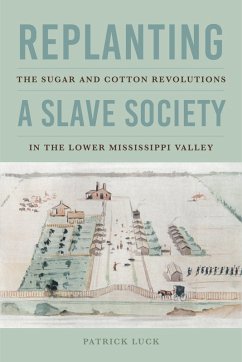Although it eventually became a regrettably profitable business for enslavers and their partners, a successful slave economy in the American South was no foregone conclusion. Bringing the lower Mississippi valley to the foreground of the history of the early republic, Replanting a Slave Society is the first major study to analyze in tandem the sugar and cotton revolutions that took place in the region in the years before and after the Louisiana Purchase in 1803. It highlights the far-ranging, at times nation-encompassing, consequences of decisions made by a small elite group of planters and merchants in a remote colonial slave society and their effect on the subsequent course of American history.
In the mid-1790s, the power and prosperity of the lower Mississippi valley's colonial elites came under threat from revolutionary instability and economic collapse. In response, those elites engaged in a successful effort to remake their society by rapidly adopting sugar and cotton production, adapting them to local conditions, taking advantage of, and advancing, the existing slave trades, and reshaping those slave trades to suit their needs. In 1811, following the successful suppression of the German Coast Insurrection (the largest slave revolt in North American history), these planter elites congratulated themselves on the stability and future prosperity of their "replanted" slave society. These crop revolutions marked a key turning point in the history of the lower Mississippi valley and set the economic and social course that the region-the hub of the Deep South-would follow until the American Civil War.
Dieser Download kann aus rechtlichen Gründen nur mit Rechnungsadresse in A, D ausgeliefert werden.









